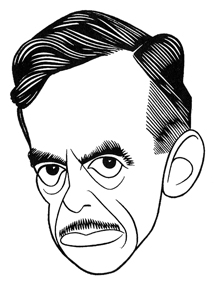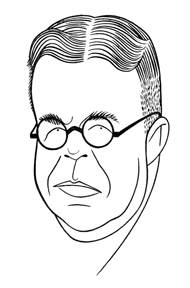Here are 10 things you should know about Roland Young, born 134 years ago today. We’ll watch any picture with his name in the credits.
Tag: Eugene O’Neill
10 Things You Should Know About Henry O’Neill
Here are 10 things you should know about Henry O’Neill, born 130 years ago today. He was one of the busiest character actors of the 1930s and ’40s, with 25 films released in 1934 alone.
10 Things You Should Know About Ralph Morgan
Here are 10 things you should know about Ralph Morgan, born 138 years ago today. A leading man on Broadway, he was primarily a character actor in pictures.
Times Square Tintypes: Eugene O’Neill
In this chapter from his 1932 book, Times Square Tintypes, Broadway columnist Sidney Skolsky profiles playwright Eugene O’Neill.
THE GREAT GOD O’NEILL
EUGENE O’NEILL. He is the only Broadway playwright who was born in Times Square. He was born in the Barrett House, now the Hotel Cadillac, at Forty-third Street and Broadway. The date: October 16, 1888.
When writing he uses either pen and ink or a typewriter. It merely depends on which is handy. Revising a play annoys him.
His father was James O’Neill—an actor famous for his portrayal of the Count of Monte Cristo. His mother, a fine pianist, attended a convent with the mother of George Jean Nathan.
He’s a great swimmer and doesn’t mind cold water.
Night life doesn’t appeal to him. He made one tour of the night clubs. It was his last.
Never attends the openings of his plays. In fact he seldom goes to a theater. He’s rather read a play than see it performed.
While at Provincetown, a feeble-minded lad of six took a great liking to him. One day while sitting on the beach the boy asked: “What is beyond the Point? What is beyond the sea? What is beyond Europe?” O’Neill answered, “The horizon.” “But,” persisted the boy, “what is beyond the horizon?”
Could grow a beard in ten days if he didn’t shave.
His father, who said he never would be a great playwright, lived to see his son’s first success, Beyond the Horizon.
He hasn’t touched a drop of liquor in the last three years.
In his youth Jack London, Joseph Conrad and Rudyard Kipling were his favorite authors. Today Nietzsche is his literary idol.
He can’t walk a mile without meeting an old friend who asks for money. He gives.
After the opening of Strange Interlude he chance to meet an old seafaring friend. O’Neill asked what he was doing, and the friend replied, “Oh, I’ve married and settled down. Got a nice little business and doing pretty good. And you, Gene, are you still working the boats?”
Reads all the reviews of his plays. He claims he knows the good critics from the bad ones.
He seldom talks unless he has something to say.
While writing he hates to be disturbed. When working at Provincetown he tacked this sign outside his door: “Go to hell.”
Is crazy about prize fights and the six-day bicycle races. When in town he will go to anything at Madison Square Garden. The only person he expressed a desire to meet was Tex Rickard.
His full name is Eugene Gladstone O’Neill. Lately he discarded the middle name entirely.
Once, when a mere infant, he was very ill in Chicago. George Tyler, then his father’s manager, ran about the streets of that city at three in the morning for a doctor.
Is always making notes for future plays. He wrote the notes for his first plays in the memorandum section of that grand publication, The Bartender’s Guide.
He likes to be alone.
He had three favorite haunts. One was Jimmy the Priest’s saloon, a waterfront dive. He later made use of this locale in Anna Christie. Another was “Hell’s Hole,” a Greenwich Village restaurant. The third was the Old Garden Hotel, which was situated on the northeast corner of Madison Avenue and Twenty-seventh Street. Here he met many people of the sporting world. A former bicycle rider (now a megaphone shouter on a sightseeing bus) he met there is still a pal of his.
It took him three years to write Strange Interlude. He had only six of the nine acts completed when he sold the play to the Theatre Guild.
He is especially fond of fine linen.
When in New York he lives in a secondary hotel. A place no one would ever think of looking for him.
He has huge hands.
For every play he draws sketches suggesting designs for the sets.
Of his own work he prefers, The Hairy Ape, The Straw (this he considers the best of his naturalistic plays), Marco Millions, Strange Interlude and Lazarus Laughed. The last is to be produced next year by the Moscow Art Theatre.
He takes great delight in recounting droll stories. Tells them with feeling and skill.
While attending Professor Baker’s class at Harvard he almost ruined the college careers of John Colton and Johnny Weaver by filling them full of beer.
Is now living in France. He does not intend to return to America for some years.
His first book, Thirst and Other One-Act Plays, was published at his expense.
All of his original manuscripts are in his possession despite offers in five figures for them.
He writes important messages which are not to be breathed to a soul, on the back of a postal card.
In Shanghai, on his recent trip around the world, he was a called a faker posing as Eugene O’Neill.
Times Square Tintypes: Owen Davis
In this chapter from his 1932 book, Times Square Tintypes, Broadway columnist Sidney Skolsky profiles perhaps the most prolific of American playwrights, Owen Davis.
CURSE YOU—JACK DALTON!
SOME people write one play and then are never heard from again. But this fellow’s inexhaustible. OWEN DAVIS.
There never will be an exact count of how many plays he wrote. He wrote at least three hundred. Between the ages of twenty-seven and forty he remembers nothing but writing plays. Somehow, between scripts, he managed to get married. Also to raise a family. Didn’t notice either until he was forty. Then took up golf.
He knows much more about a lot of theatrical managers than they care to have him know.
Had a unique contract with A. H. Woods. It stated that for a period of five years he could write plays for Woods only. Also stated that during that period Woods couldn’t produce any plays but his. During those years he wrote fifty-eight melodramas, or a play a month for five years.
He’d go to Europe tomorrow if they’d build a railroad across the Atlantic Ocean.
He doesn’t drink. He’d like to.
Is a Harvard graduate. Played football on the Crimson eleven. Also held that college’s record for the hundred-yard dash until four years ago.
In those days of the thrilling melodramas Woods would select a title and order terrifying lithographs of maidens in peril. Then Davis would write a play to fit both the title and the picture.
Perhaps you recall some of them. They include such titles as Through the Breakers, Deadwood Dick’s Last Shot, The Chinatown Trunk Mystery, Confessions of a Wife, The Gambler from the West, Tony the Bootblack, The Great Express Robbery, Queen of the Opium Ring, Convict 999, Broadway After Dark, The Policeman and the Millionaire’s Wife, The Creole Slave’s Revenge, A Chorus Girl’s Luck in New York, and Edna, the Pretty Typewriter.
He doesn’t remember writing Bertha, the Sewing Machine Girl, although he is credited with it.
His play Icebound won the 1923 Pulitzer prize. The Detour he considers his greatest play.
Always smokes cigars. At rehearsals he makes a little cup from a newspaper to flick his ashes in. He is well house broken.
Clarence Darrow is his idea of the greatest American.
Prefers the theatre to the movies, ices to ice cream, a four-in-hand to a bow tie, a cold bath to a hot one, poker to bridge and a wicked woman to a simple one.
The first theatrical flashlight ever made was of his play The Road to Paradise. It is now pasted on the wall of his workroom. Among those in it are Mrs. Davis, then the “You Ain’t Done Right by Our Nell” girl. And George Jessel‘s stepmother, then very interested in keeping the villain from foreclosing on the old homestead.
Wrote his first play, The Rival Detectives, at the age of eight. All the characters in it were murdered.
His ambition is to have a perfect script after the first writing. Thought he had it with The Nervous Wreck. Then had to rewrite it seven times.
Once was turning out so many plays that he had to write under seven different names. Two of the nom de plumes, Robert Wayne and John Oliver, became well known. In fact, a Pittsburgh dramatic critic wrote a piece about John Oliver stating that “at last a man had come along to drive Owen Davis out of business.”
Eugene O’Neill is his favorite playwright.
When writing he moods himself to the play. While working on Chinatown Charlie he lived on chop suey.


